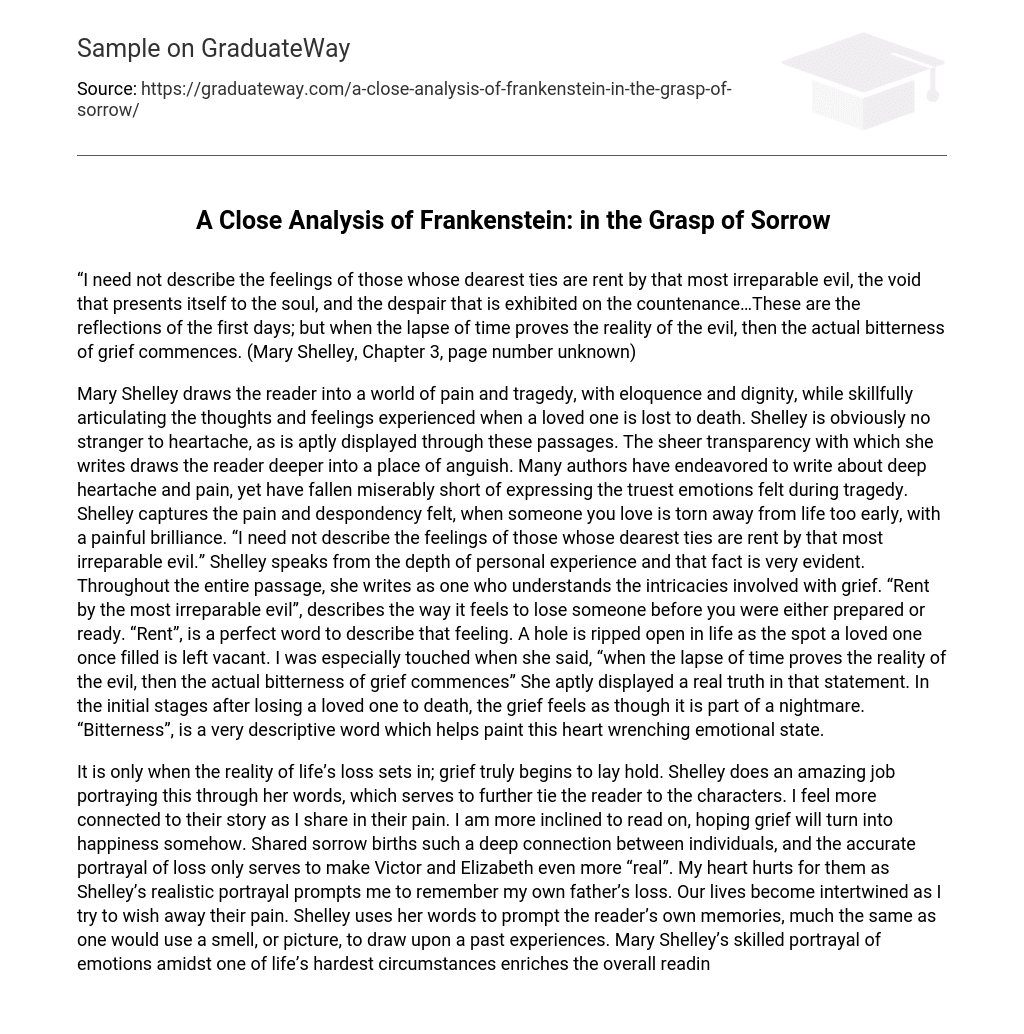“I need not describe the feelings of those whose dearest ties are rent by that most irreparable evil, the void that presents itself to the soul, and the despair that is exhibited on the countenance…These are the reflections of the first days; but when the lapse of time proves the reality of the evil, then the actual bitterness of grief commences. (Mary Shelley, Chapter 3, page number unknown)
Mary Shelley draws the reader into a world of pain and tragedy, with eloquence and dignity, while skillfully articulating the thoughts and feelings experienced when a loved one is lost to death. Shelley is obviously no stranger to heartache, as is aptly displayed through these passages. The sheer transparency with which she writes draws the reader deeper into a place of anguish. Many authors have endeavored to write about deep heartache and pain, yet have fallen miserably short of expressing the truest emotions felt during tragedy. Shelley captures the pain and despondency felt, when someone you love is torn away from life too early, with a painful brilliance. “I need not describe the feelings of those whose dearest ties are rent by that most irreparable evil.” Shelley speaks from the depth of personal experience and that fact is very evident. Throughout the entire passage, she writes as one who understands the intricacies involved with grief. “Rent by the most irreparable evil”, describes the way it feels to lose someone before you were either prepared or ready. “Rent”, is a perfect word to describe that feeling. A hole is ripped open in life as the spot a loved one once filled is left vacant. I was especially touched when she said, “when the lapse of time proves the reality of the evil, then the actual bitterness of grief commences” She aptly displayed a real truth in that statement. In the initial stages after losing a loved one to death, the grief feels as though it is part of a nightmare. “Bitterness”, is a very descriptive word which helps paint this heart wrenching emotional state.
It is only when the reality of life’s loss sets in; grief truly begins to lay hold. Shelley does an amazing job portraying this through her words, which serves to further tie the reader to the characters. I feel more connected to their story as I share in their pain. I am more inclined to read on, hoping grief will turn into happiness somehow. Shared sorrow births such a deep connection between individuals, and the accurate portrayal of loss only serves to make Victor and Elizabeth even more “real”. My heart hurts for them as Shelley’s realistic portrayal prompts me to remember my own father’s loss. Our lives become intertwined as I try to wish away their pain. Shelley uses her words to prompt the reader’s own memories, much the same as one would use a smell, or picture, to draw upon a past experiences. Mary Shelley’s skilled portrayal of emotions amidst one of life’s hardest circumstances enriches the overall reading experience of Frankenstein, and simultaneously, draws the reader into to the story in a much more intimate capacity. Heartfelt descriptions, drawn from Shelley’s own past experiences of pain, enrich this passage in a beautiful, heart wrenching way.
Works Cited
Shelley, M. 1818. “Frankenstein”.ebooks@Adelaide. March 28, 2013. http://www.ebooks.adelaide.edu.au/s/shelley/mary/s53f/index.html.





